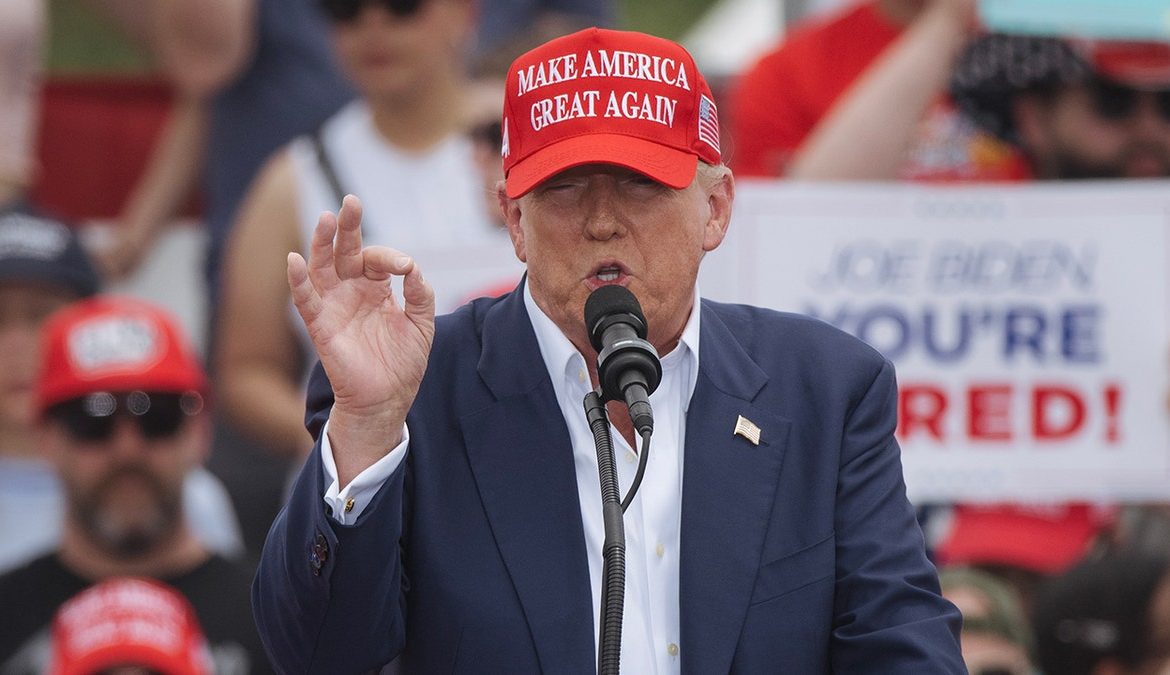
Who has the ‘Keys to the White House’? Historian with ace record calling elections weighs in on Trump verdict

Former President Trump’s criminal conviction in his historic New York trial may have thrown the 2024 presidential election into unprecedented upheaval – or it may not have, according to Dr. Allan Lichtman.
The American University historian, who has correctly predicted the outcome of nine of the last 10 U.S. presidential elections, told Fox News Digital that instant analysis of Trump’s conviction is meaningless as the country looks forward to Election Day. ‘We’re not going to know much until the sentencing hearing on July 11, right before the Republican convention,’ Lichtman said in an interview.
Allowing himself to speculate, the proven prognosticator said Trump’s conviction on 34 felony counts of falsifying business records does not appear to have fundamentally cracked his base, which Trump will need united to defeat President Biden in November. But no one knows, neither Lichtman nor the pundits he perennially outperforms, how Americans outside Trump’s base will react to a convicted criminal on the presidential ballot.
‘We don’t know how this might affect moderate and swing independent voters. So really, we have got to look over time and not rely on instant, unreliable punditry,’ said Lichtman.
Lichtman is a historian, not a psychic. The formula he’s used to correctly predict nearly every presidential race since 1984, his ‘Keys to the White House,’ was developed in 1981 with mathematician Vladimir Keilis-Borok and is based on their analysis of presidential elections dating back to 1860. The secret to his success, Lichtman says, is to keep his own personal preferences out of his predictions.
‘We reconceptualize presidential elections not as Carter versus Reagan, Republican versus Democrat, liberal versus conservative, but in geophysical terms,’ he explained. ‘Stability: The White House party keeps power. Earthquake: The White House party is turned out.’
The ‘keys’ consist of 13 true or false questions, parameters that, if true, favor stability. When eight or more of the keys are false, the incumbent White House party is the predicted loser. This formula helped Lichtman correctly predict that Trump would prevail in 2016, when the polls, debate performances and political commentators all favored Democrat Hillary Clinton. Previously, he said President Barack Obama would win re-election when Republican Mitt Romney was favored. And he correctly called the 2020 election for Biden.
‘The keys are an alternative to the polls, which are not predictors. They’re snapshots, they’re abused, not used as predictors. And the pundits, you know, who are a lot of fun, but they’re sports talk radio. They have no scientific basis for any of their predictions,’ Lichtman argued.
The 2024 election is still in flux, and so Lichtman has not made a final projection for this year. But a lot would have to go wrong for Biden to lose to Trump, he claims.
Lichtman’s keys are as follows: party mandate, contest, incumbency, third party, short-term economy, long-term economy, policy change, social unrest, scandal, foreign/military failure, foreign/military success, incumbent charisma and challenger charisma.
As things stand, Biden has definitively lost two of Lichtman’s keys. ‘He’s lost what I call the mandate key based on midterm elections, because the Democrats lost seats in 2022, they needed to win seats to win that key. And he loses the charisma key because he’s no Franklin Roosevelt or John F. Kennedy,’ Lichtman said.
If six keys turn against Biden, he is likely to lose. The four keys to watch are whether Robert F. Kennedy, Jr., or another third-party candidate wins at least 10% support in national polls; social unrest linked to widespread anti-Israel protests on college campuses, and success or failure for Biden’s foreign policy endeavors amid the wars in Ukraine and Gaza.
Several Democratic strategists and a number of pundits are losing confidence in Biden’s campaign as polls show Trump ahead in several key swing states. Election data guru and FiveThirtyEight founder Nate Silver suggested Monday that the president’s ‘all-time low’ in approval ratings might be enough justification for him to drop out or for the party to nominate someone else at the Democratic convention in August.
Lichtman warns that replacing Biden would be a massive unforced error for Democrats.
‘With Biden running, he wins my incumbency key: sitting president. He wins the party contest: uncontested. Essentially, that means he wins two keys off the top,’ Lichtman explained.
Without Biden on the ticket, the Democrats would automatically lose two more keys, meaning just four more would have to fall to predict their defeat.
‘This nonsense about Biden stepping down points to the dangers of off-the-top-of-the-head punditry and commentary that is not based on any scientific understanding of how elections work,’ Lichtman said.
Doom and gloom punditry is part of what Lichtman calls the ‘political industrial complex’ – an iron triangle of pollsters and political consultants who profit from campaigns, news reporters eager to cover negative soundbites and politicians who are afraid to challenge the other two points of the triangle. The horse race theory of elections creates drama and makes money for those involved, Lichtman claims, but it’s not very helpful to inform Americans about the direction of the country.
‘The keys provide a way of breaking the iron triangle,’ said Lichtman. ‘The candidates themselves have to run different kinds of campaigns,’ he added. ‘Campaign by the keys, which is, you campaign on your vision. If you’re an incumbent, what it is you have done and what you expect to do. If you’re a challenger, what’s your clear vision for America?’
Nobody remembers conventional campaigns. The ones that make history, Lichtman argues, are the substantive campaigns that articulated a vision for the country – think Barry Goldwater in 1964, who lost in a landslide but defined conservative principles for generations to come. Or George McGovern, whose liberal principals have shaped the Democratic Party since he was defeated by Richard Nixon in 1972.
‘Ronald Reagan in 1980 very forthrightly put forth his views on tax cuts, deregulation, building the military, challenging the Soviet Union. And he won, he won big,’ Lichtman said. ‘And that philosophy again influenced politicians, in his case both liberal and conservative, through our time.’
Fox News Digital’s Aubrie Spady and Joe Schoffstall contributed to this report.
